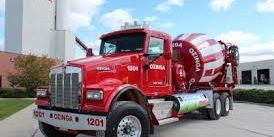Concrete producers become indispensable partners by ‘coming clean’ with customers.
Concrete producers continually struggle to gain a competitive edge. For instance, they often develop branded materials, although they are limited in how they can change the basics of cement, concrete, or aggregate. A more direct approach is to focus on providing customers a profit incentive that will keep them coming back.
Ozinga Bros., Mokena, Ill., has kept customers coming back for almost 90 years. They have become a major player in the Midwest by constantly asking, “What can we do for our customers that others don’t?”
Technology is a large part of Ozinga’s answer. The ready-mix producer and building materials supplier makes calculated investments in technology that improves its processes and sharing the benefits with customers, to ensure they won’t find better service (information, support, etc.) anywhere else.
“If we can find a way to make customers more profitable, we’re going to be the ones they call,” says Keith Onchuck, chief information officer at Ozinga. Onchuck manages and implements data systems and tools, focusing on continuous improvement. A key initiative is harnessing real-time information for employees and customers alike.
More upfront information
Ozinga recently invested in streamlining its entire quote-to-cash process. Salespeople and customers have more information up front, salespeople can place and process orders more quickly, and customers have access to their historical data. “Improving our internal processes and reducing juggling behind the scenes benefits everyone,” says Onchuck.
Ozinga’s sales team uses a mobile tool to see customer histories, past quotes, and other data needed in the quoting process. They use tablets to enter orders directly into Ozinga’s ticketing system, reducing processing time and data entry errors. Customers log in to their MyOzinga accounts online to request a quote and see order and account histories.
Ozinga is also launching a MyOzinga mobile app to give customers better visibility into day-to-day operations. “We want to eliminate the old chess game between contractors and dispatch, and repeated phone calls about truck statuses,” says Onchuck.
The producer is moving toward giving customers real-time data on truck statuses, orders, and tickets. “Transparency is even more relevant in our industry than others because there are so many variables and external factors at play,” he says. “If our dispatchers and customers can see and react to what’s really going on, they can make better decisions.”
Like other producers, Ozinga has debated the pros and cons of being fully transparent with customers. Ultimately, they feel there are more benefits to sharing information. “Opening the Pandora’s Box of data is kind of a double-edged sword,” says Onchuck. “But it’s better to come clean with our customers if something goes wrong. It establishes credibility in our relationships.” For example, Ozinga’s trucks might be late on a given day, but the customer may have held trucks longer for unloading another day.
“The only way we can improve and become better partners is by learning from our mistakes. We know technology is fallible, but we’re also providing a level of detail other producers don’t…or won’t.”
